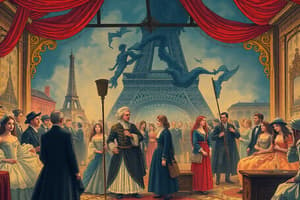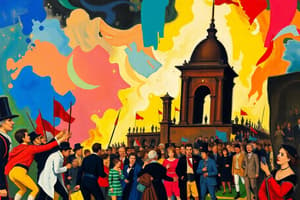Podcast
Questions and Answers
What title did Napoleon claim when he was crowned on December 2, 1804?
What title did Napoleon claim when he was crowned on December 2, 1804?
- King of Italy
- Supreme Commander of the Army
- Emperor of the French Empire (correct)
- Chancellor of France
In which location was Napoleon crowned King of Italy?
In which location was Napoleon crowned King of Italy?
- Notre Dame de Paris
- Milan Cathedral (correct)
- St. Peter's Basilica
- Versailles
Which battle led to the defeat of Napoleon and the fall of the French Empire?
Which battle led to the defeat of Napoleon and the fall of the French Empire?
- Battle of Waterloo (correct)
- Battle of Austerlitz
- Battle of Leipzig
- Battle of Jena-Auerstedt
What was the primary purpose of creating eighteen Marshals of the Empire?
What was the primary purpose of creating eighteen Marshals of the Empire?
Which coalition was formed in 1806 against Napoleon?
Which coalition was formed in 1806 against Napoleon?
Who were the primary commanders that defeated Napoleon at the Battle of Waterloo?
Who were the primary commanders that defeated Napoleon at the Battle of Waterloo?
To which location was Napoleon exiled after his defeat?
To which location was Napoleon exiled after his defeat?
What was the significance of the Battle of Jena-Auerstedt in 1806?
What was the significance of the Battle of Jena-Auerstedt in 1806?
Which pamphlet is considered the manifesto of the French Revolution?
Which pamphlet is considered the manifesto of the French Revolution?
What significant event did he assist in instigating in 1799?
What significant event did he assist in instigating in 1799?
What was the primary reason the First Estate held significant power?
What was the primary reason the First Estate held significant power?
Which group formed the majority in the National Assembly?
Which group formed the majority in the National Assembly?
What was one of the actions taken at the Tennis Court during the early stages of the Revolution?
What was one of the actions taken at the Tennis Court during the early stages of the Revolution?
Which figure is NOT associated with the major participants in the warfare legacy of Napoleon?
Which figure is NOT associated with the major participants in the warfare legacy of Napoleon?
What was one of the key objectives of Prussia during the post-Napoleonic period?
What was one of the key objectives of Prussia during the post-Napoleonic period?
Which political philosophy emphasized the preservation of traditional institutions and opposition to radical change?
Which political philosophy emphasized the preservation of traditional institutions and opposition to radical change?
Which of the following best describes the Napoleonic Code?
Which of the following best describes the Napoleonic Code?
What was a notable legacy of Napoleon's actions in Europe?
What was a notable legacy of Napoleon's actions in Europe?
What was one of the primary motivations behind the rise of German nationalism during Napoleon's conquests?
What was one of the primary motivations behind the rise of German nationalism during Napoleon's conquests?
Which territories were affected by the political changes surrounding Metternich's System?
Which territories were affected by the political changes surrounding Metternich's System?
What aspect of military organization was emphasized in Napoleon's military developments?
What aspect of military organization was emphasized in Napoleon's military developments?
Which of the following is a defining characteristic of Liberalism as discussed in this context?
Which of the following is a defining characteristic of Liberalism as discussed in this context?
Which of the following correctly identifies one of the reactions of conservatism in response to the French Revolution?
Which of the following correctly identifies one of the reactions of conservatism in response to the French Revolution?
What proportion of the French population did the Second Estate represent?
What proportion of the French population did the Second Estate represent?
Which of the following statements is true regarding the wealth distribution among the estates?
Which of the following statements is true regarding the wealth distribution among the estates?
What was the impact of the Enlightenment on the Third Estate as expressed by Comte D’Antraigues?
What was the impact of the Enlightenment on the Third Estate as expressed by Comte D’Antraigues?
What was a significant socio-economic challenge faced by the Third Estate leading up to the French Revolution?
What was a significant socio-economic challenge faced by the Third Estate leading up to the French Revolution?
In Emmanual Joseph Sieyès' view, how did the Third Estate perceive their role in contrast to the other estates?
In Emmanual Joseph Sieyès' view, how did the Third Estate perceive their role in contrast to the other estates?
Why did the Third Estate face unrest during the period leading up to the French Revolution?
Why did the Third Estate face unrest during the period leading up to the French Revolution?
Which statement correctly describes the taxation situation of the Third Estate?
Which statement correctly describes the taxation situation of the Third Estate?
How did the upper estates perceive the role of the Third Estate according to Enlightenment thinkers?
How did the upper estates perceive the role of the Third Estate according to Enlightenment thinkers?
What event does the term 'September Massacres' refer to?
What event does the term 'September Massacres' refer to?
Who was a prominent leader of the Jacobins during the French Revolution?
Who was a prominent leader of the Jacobins during the French Revolution?
What was one of the advocacy points of Jean-Paul Marat as a delegate?
What was one of the advocacy points of Jean-Paul Marat as a delegate?
What was the outcome of Marie Antoinette's trial?
What was the outcome of Marie Antoinette's trial?
Which term is often used to describe the period associated with the harsh measures taken by the Jacobins?
Which term is often used to describe the period associated with the harsh measures taken by the Jacobins?
Who murdered Jean-Paul Marat?
Who murdered Jean-Paul Marat?
What role did the National Convention play beginning in September 1792?
What role did the National Convention play beginning in September 1792?
What does the painting 'The Death of Marat' symbolize?
What does the painting 'The Death of Marat' symbolize?
Study Notes
The French Revolution (1789-1815)
- France was a large and prosperous nation with a robust foreign trade before the revolution.
- There was a great deal of unrest in France due to bad harvests, high prices, and high taxes.
- The French population was divided into three estates:
- First Estate (Clergy): 1% of the population, owned 10% of the land and had high offices, and were exempt from paying taxes
- Second Estate (Nobility): 2% of the population, owned 20% of the land and paid almost no taxes.
- Third Estate (Commoners): 97% of the population, paid high taxes and had low wages
- The Third Estate felt that they were not properly represented or treated by the government, which led to increasing discontent.
- The Enlightenment ideas of individual liberty, equality, and popular sovereignty influenced the French people and led to the revolution.
The Dawn of the Revolution
- The National Assembly was formed in 1789 and replaced the Estates-General which was controlled by the First and Second Estates.
- The Tennis Court Oath was a pivotal moment in the revolution, with the Third Estate pledging to not disband until a new constitution was formed.
- The National Assembly created a proposed constitution which led to the formation of factions within France.
- The September Massacres occurred in 1792 and exemplified the growing violence and instability of the revolutionary period.
The Rise of the Jacobins
- The Jacobins were the most radical political group in the French Revolution.
- Jean-Paul Marat was a leading figure in the Jacobin movement and advocated for far-reaching reforms.
The Reign of Terror
- The Jacobins established the Reign of Terror, a period of mass persecution and executions.
- The Reign of Terror culminated in the execution of Louis XVI and Marie Antoinette.
The Rise of Napoleon
- Napoleon Bonaparte seized power in a coup d'état and established the French Empire.
- Napoleon was crowned Emperor of France in 1804.
- Napoleon's Empire extended across much of Europe and led to widespread conflict.
Napoleonic Wars
- Napoleon's ambition to conquer Europe resulted in a series of wars involving France and various coalitions of European powers.
- Famous battles include the Battle of Jena-Auerstedt and the Battle of Waterloo.
Legacy & Impact of Napoleon
- Napolean's legacy continues to be debated. Some view him as a ruthless dictator, while others see him as a brilliant military leader.
- Napoleon's reforms had a significant impact on Europe. His legal codes, educational system, and military innovations shaped the continent's political and social landscape.
- His downfall and exile to Saint Helena in 1815 marked the end of his reign but his legacy remains.
Conservatism and Liberalism
- Conservatism was a reaction against the violent changes of the French Revolution.
- Conservatism sought to preserve historical institutions and traditions.
- Liberalism was a political philosophy that advocated for individual rights, freedom, and popular sovereignty.
- Liberalism aimed to reform political structures and advance the idea of equality.
Metternich's System
- After Napoleon's defeat, European monarchs sought to restore order and stability.
- The Congress of Vienna, led by Austrian Chancellor Klemens von Metternich, aimed to prevent revolutions and maintain a balance of power.
- Metternich's System, a series of agreements, sought to re-establish traditional monarchies and reduce the spread of revolutionary ideas.
Studying That Suits You
Use AI to generate personalized quizzes and flashcards to suit your learning preferences.
Related Documents
Description
Explore the key events and social structures that led to the French Revolution from 1789 to 1815. This quiz covers the influential estates in France, the impact of Enlightenment ideas, and the formation of the National Assembly. Test your knowledge of the causes behind one of history's most pivotal uprisings.




